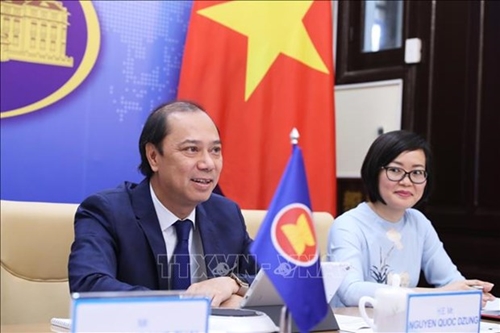Attending the event were high-ranking officials, prestigious scholars and experts, and representatives of businesses from 10 ASEAN Member States and China, Japan and the Republic of Korea, and guests from regional and international organisations.
    |
 |
|
Deputy Foreign Minister Nguyen Quoc Dung (left). |
In his opening remarks, Deputy Foreign Minister Nguyen Quoc Dung, who head of the ASEAN SOM of Vietnam, said that the ASEAN Plus Three cooperation, established in 1997 amidst the regional financial crisis, has advantage of actively responding to challenges, notably the SARS 2003, the economic-financial crisis 2008, and the COVID-19 pandemic.
He expressed his hope that the forum will set forth orientations and measures to effectively carry out the Declaration of ASEAN Plus Three leaders on strengthening cooperation for economic and financial resilience in the face of emerging challenges, which was initiated by Vietnam and adopted at the recent 23rd ASEAN Plus Three Summit.
China’s Deputy Foreign Minister Luo Zhaohui affirmed the importance of collaboration in maintaining open, safe and stable supply chains; boosting regional integration; and responding to emerging non-traditional security challenges and diseases.
He proposed exploiting potential of emerging markets, stepping up exchanges on financial policies to build a regional financial safety network, make the Regional Comprehensive Economic Partnership (RCEP) agreement soon become effective, and speed up the application of 5G technology, digital transformation and e-commerce development.
At the forum, senior officials and experts made many recommendations, such as setting up a regional financial cooperation centre to support ASEAN countries, supporting enterprises, especially those with small and medium sizes, through financial assistance packages, investing in developing high-quality infrastructure, and promoting the use of domestic currencies in trade, investment and financial transactions among ASEAN Plus Three countries.
They also shared experience in expanding collaboration in financial technology, stepping up digital payments and e-commerce, increase the use of renewable energies to increase the sustainability of economies.
Many stressed the need to continue narrowing development gap, boosting sustainable development in sub-regions to speed up the region’s comprehensive and sustainable economic development efforts.
To deal with economic and financial shocks from outside promptly and effectively, they agreed to improve the macro-economic monitoring system and early warning capacity, intensify economic and financial policy coordination, and consolidate such regional mechanisms as the Chiang Mai Initiative Multilateralisation (CMIM), the ASEAN+3 Macroeconomic Research Office (AMRO) and the Asian Bond Markets Initiative (ABMI).
Source: VNA